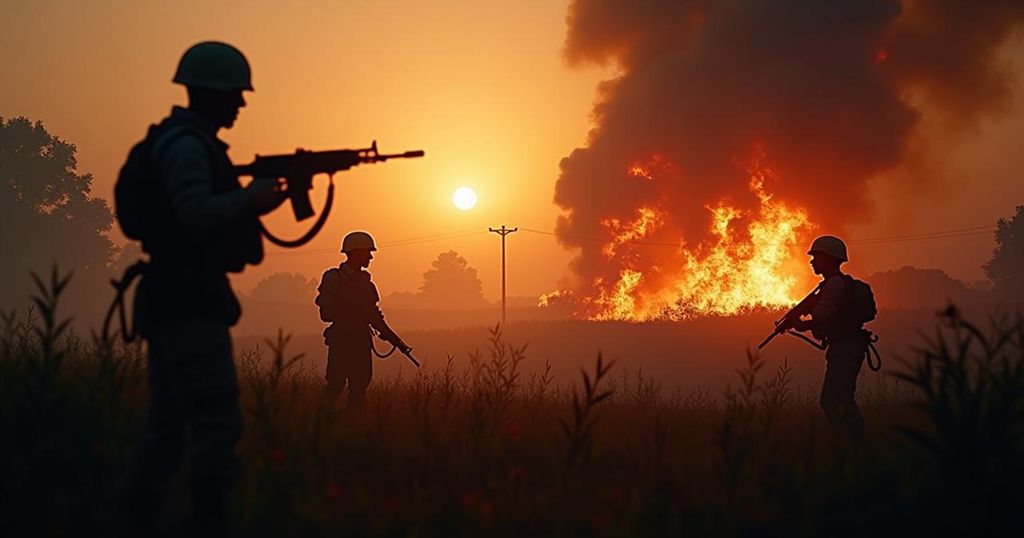Tragic Shooting of Migrants by Mexican Army Raises Urgent Calls for Accountability and Reform
Mexican army troops shot at a truck with migrants near the Guatemalan border, killing six individuals and injuring ten others. The incident has drawn condemnation from President Claudia Sheinbaum and criticism regarding the militarization of immigration policy in Mexico. Investigations are underway to ensure accountability for the soldiers involved, amid rising concerns over violence against migrants in the region.
Mexican military personnel opened fire on a truck transporting migrants near the Guatemalan border, resulting in the tragic death of six individuals from Egypt, Peru, and El Salvador, an incident condemned by President Claudia Sheinbaum as “deplorable.” In addition to the deceased, ten other migrants sustained injuries in the attack, prompting swift reaction from Peru’s Foreign Ministry, which confirmed the loss of a Peruvian national and called for an urgent investigation. The event, which took place on Sheinbaum’s first day in office, marks one of the most severe instances of migrant fatalities at the hands of authorities in Mexico in recent history. Previous record-holder incidents, including the killing of 17 migrants in Tamaulipas in 2021, underscore a troubling trend in the militarization of immigration enforcement in the region. According to the Defense Department, the trained military personnel claimed they perceived a threat as three trucks approached their position, prompting the gunfire. Upon inspection of one of the trucks, authorities discovered four deceased migrants and 12 injured individuals. Local prosecutors confirmed that all victims died from gunshot wounds, yet the Defense Department did not disclose whether the migrants fired any weapons or if the army’s fire resulted in the fatalities. Out of 33 migrants in the vehicle, there were 17 survivors. The two soldiers involved in this distressing incident have been handed over to civilian authorities for investigation, while military protocols dictate that any actions towards civilians can lead to both civilian prosecution and court-martial proceedings. Irineo Mujica, a prominent migrant rights advocate, expressed skepticism regarding claims of resistance from the migrants, characterizing it as improbable due to their reliance on bribes for safe passage. Moreover, the Roman Catholic Council of Bishops decried the excessive use of force by stating that such occurrences are symptomatic of a broader issue arising from the militarization of immigration policies in Mexico. The ramifications of this event could pose a significant challenge for President Sheinbaum, particularly as she has recently upheld the precedence established by her predecessor to empower military forces within law enforcement and other sectors. Given this context, the shootings not only highlight critical issues surrounding migration in Mexico but also raise questions about the broader implications of security policies and their impact on vulnerable populations.
The incident is situated against a backdrop of increasing violence related to migration and drug trafficking in Mexico, particularly at the southern border where the presence of armed forces has been intensified. Previous incidents have established a pattern of confrontations between military or police forces and migrant groups, often resulting in fatalities. This specific shooting raises urgent issues about the operational protocols of the military concerning civilian interactions and the ongoing debate about the militarization of immigration policy, which critics argue leads to tragic outcomes for migrants fleeing desperate circumstances.
The shooting of migrants by Mexican military personnel represents a grave humanitarian crisis that underscores the urgent need for reform in military engagement with civilian populations, particularly in contexts involving vulnerable migrants. This incident not only calls for thorough investigation and accountability for those involved but also highlights the larger issues associated with immigration policy and the protection of human rights within Mexico. President Sheinbaum’s administration now faces the challenge of addressing this situation transparently and effectively to restore faith in the state’s commitment to human rights and migrant safety.
Original Source: abcnews.go.com




Post Comment